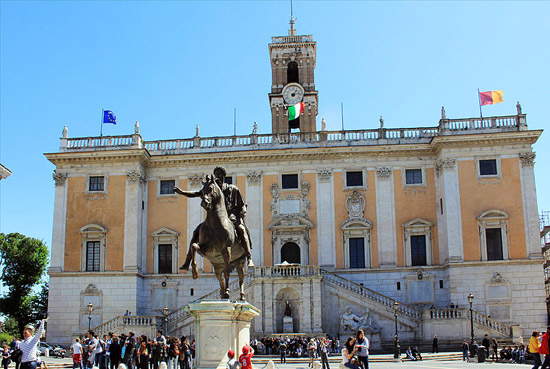In Rome, should archaeologists and art historians find another job?
In an interview with AgoraVox at the height of the election campaign, the current mayor of Rome Ignazio Marino declared that his intent was to “remake Rome as a place of culture, innovation, meritocracy and secularism.” There would be so much to discuss about these words, so let us just dwell on the first concept: culture. Well: back in the spring, when the Municipality of Rome announced cuts of several million euros to culture (and Councillor Flavia Barca declared that we should be happy, because the cuts could be far worse), many foreshadowed truly unsympathetic scenarios for Roman culture.
And this dislike of culture, and especially of those who have invested time, money, passion and training in culture, is emerging with all its overbearingness these days. First with the news of the agreement between the Municipality of Rome and Enel for the enhancement of the heritage of the Capitoline Museums: according to media reports, many of the archaeological assets of theAntiquarium of the Capitoline Museums will undergo a careful operation of study and analysis that will take place not, as we all might think, on national soil, which abounds with highly prepared and very valuable archaeologists, many of them underpaid, precarious and often exploited but in the United States of America, and to be exact at the University of Missouri. Moreover, on this initiative, there are already those who have also advanced doubts, such as Lucio Del Corso, a papyrologist at the University of Cassino, who wonders what criteria ever led to the choice of the University of Missouri, whether it makes sense to spend tens of thousands of euros for the transport and insurance of the finds (when they could be catalogued on site), whether it obviously would not have been better to entrust this work to our archaeologists, and whether the operation does not conceal a “sick and provincial foreignophilia.”

In addition, as if that were not enough, a few days ago the Municipal Superintendency of Cultural Heritage of Rome published on its website the public notice for the search of voluntary associations, cultural associations for the performance of free activities to be carried out at museums and archaeological and monumental areas within the competence of the Capitoline Superintendency. These activities, which, we emphasize, are to be carried out free of charge, every day of the week, from 10 a.m. to 4 p. m. (so much for volunteering: in fact, it is a part-time job) , will consist of “the first reception of visitors,” “support for surveillance through the deterrent constituted by the attentive presence of volunteers,” and above all, “information, orientation and accompaniment of individuals or groups of people.” For the record, it should be mentioned that the notice also provides for reimbursement of expenses, “not exceeding 12.00 euros per volunteer per day of activity lasting 4 hours.” Very rich, no doubt about it.
The first question that arises is: but is it normal for a municipality to sign an agreement with Enel to pay for studies to be carried out in the United States, while instead entrusting staff who will work essentially free of charge, and on a voluntary basis, with the activities to be conducted in its museums? The second: but with what courage do politicians continue to talk about promoting culture when the facts show that the direction the country is taking is the diametrically opposite? The third: but where has the respect gone for all those people who have made sacrifices to study archaeology and art history, and are being sneered at in the first case by an initiative that will bring abroad artifacts that could have been studied just as well in Italy, while in the second by the search for volunteers for activities such as information and orientation, which would surely be carried out better by paid staff? Fourth, what respect do we have for the public if we continue to think that volunteer staff should progressively replace permanent paid staff?
And let’s not make ridiculous excuses: when a daily presence is required, even on holidays, for six hours a day, it is no longer volunteer work. It is a way of finding free labor by exploiting the noble principles that underlie volunteerism. Which, we reiterate, is important and should be promoted and protected, but not when it replaces paid work.
As Fabrizio of the wonderful Mo(n)stre page rightly wondered in a post shared on Facebook this morning: but what are we doing about it? The answers should come from the institutions and bodies that promote these initiatives. But it seems as if, for their part, archaeologists and art historians are getting, conversely, invitations to find another job. And this is something that offends, hurts and humiliates those who have invested in an often high level of education in these fields, especially if we think that we live in a place where the rhetoric of “the most beautiful country in the world” and “the country with the largest cultural heritage in the world” reigns. Never were deeds further from words!
Warning: the translation into English of the original Italian article was created using automatic tools. We undertake to review all articles, but we do not guarantee the total absence of inaccuracies in the translation due to the program. You can find the original by clicking on the ITA button. If you find any mistake,please contact us.



























